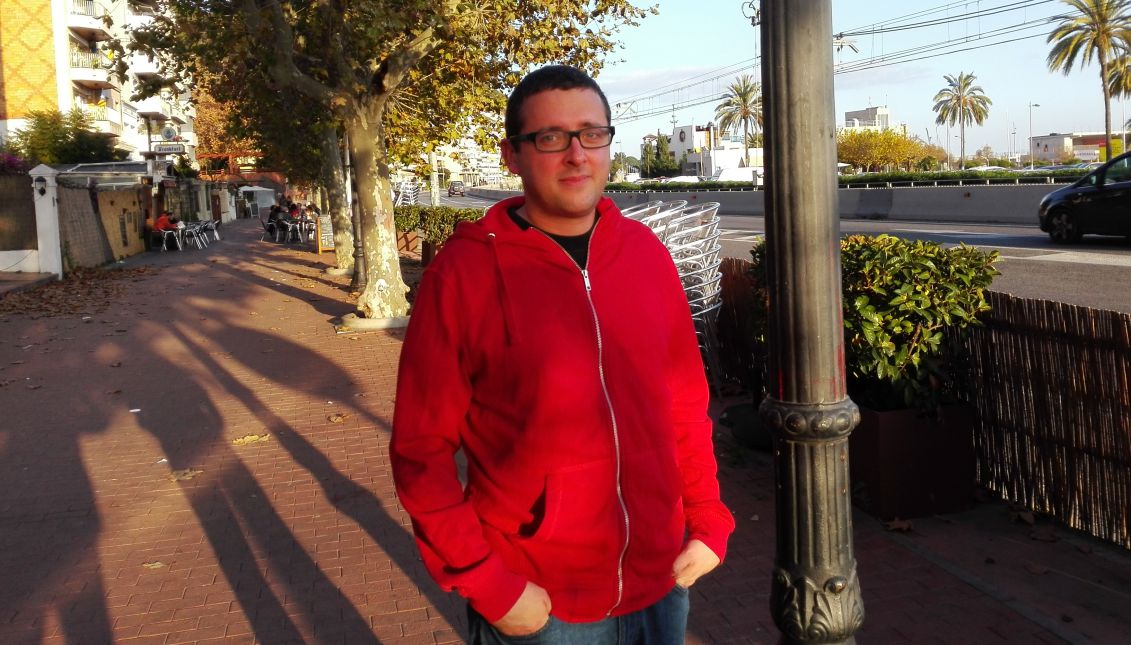
“All My Tales Happen In Colombia”
AL DIA speaks with Colombian author Luis Noriega, winner of the 2016 Gabriel García Márquez literary award.
AL DIA speaks with Colombian author Luis Noriega, winner of the 2016 Gabriel García Márquez literary award. He currently lives in Barcelona, Spain.
Luis Noriega arrived in Barcelona more than eighteen years ago, although he admits it was by accident. "I was living in London and I wondered what would be the nicest and cheapest place to live in Europe, so I bet on this city," recalls the 44-year-old Colombian writer who last month won the Gabriel García Márquez Award or short stories, the most important award in this category in the Hispanic world. The awarded book is called: Razones para desconfiar de sus vecinos (Reasons to distrust your neighbors), published by Random House and available on Kindle. The prize is worth $100,000.
"An award like this allows me to dedicate myself completely to writing, without having to scratch time to the jobs that pay my bills," says Noriega, who regularly works as translator for a living.
Noriega has big blue eyes and his cheeks blush every time he talks about himself. We are sitting at a terrace in Arenys de Mar, watching the families go out for a walk by the sea, enjoying the warm winter sun of the Mediterranean.
Twelve years ago, Noriega and his wife moved to this little fishing village on the outskirts of Barcelona, looking for a quieter place to raise their kids and write in peace. "I've always been pretty conventional: I behaved well in college, I married my lifelong girlfriend and I always wanted to have children," he jokes.
Today, Luis and his wife, Alejandra, have two children, aged 9 and 3, who are fully integrated in this small Catalan village. While the children go to school, Luis stays at home, writing a new story or working on a translation, the job with which he makes a living since he arrived in Barcelona, in 1998.
"At the age of 15 I was quite sure that I wanted to be a writer," explains Noriega, nervously stirring his coffee. His passion for writing began during his student years in the Jesuit school of Bucaramanga (capital of the Santander district, in inner Colombia), where a professor insisted that he had talent and encouraged him to write. When he finished school, Luis left for Bogota to study Literature, "a career that I did not know if would serve me much to become a writer, but at least I knew I would read," he jokes.
Later on, Noriega made his first steps as a university professor and literary critic, an experience that later served him to portray in his books the academic and literary world of Bogota. However, the atmosphere of violence and insecurity in the streets of the Colombian capital at that time, in addition to a couple of unfortunate personal experiences (a friend of his was killed while somene tried to steal his shoes) , made Noriega anxious to go abroad. In 1998, at the age of 26, he left for London to learn English and since then, he has never lived again in Colombia. "I almost feel I am a local now," says Noriega, watching the families walk along the promenade by the sea.
Violence always in mind
In London he began to write his first work, Iménez, a science fiction novel placed in the future, in an apocalyptic Bogota. The main protagonist has to ensure that Bogota citizzens commit suicide when they turn 45.
"I wanted to make a metaphor about my country, about the violence of Bogota. The Colombian capital is a very stereotyped society, full of contrasts, where a few rich people live surrounded by a mass of poor, "he explains.
It has been 20 years since he wrote Imnez and Noriega admits that the country has changed a lot: "It is the drip economy, little by little the middle class is growing, but it is still a hostile society."
And it is precisely this sense of insecurity, of permanent suspicion from the guy next door, that serves as inspiration for his new awarded book, Reasons to distrust his neighbors. One of the chapters reads:
"Every time I saw that old lady by the window, hidden behind the curtain, I said to myself : " there's she is, that gossip old bag again, but I stopped there. Then I became aware of other details, for example, that they never went out. Neither on weekends. What were they doing locked up there all the time? "
Shortly after arriving in Barcelona, Noriega won a major science fiction award for Iménez, which helped him to introduce himself to the Spanish literary scene and find a job in a publishing house. "I worked as linguistic corrector, translator ... It was the years of the real estate bubble, before the crisis. Many Latin Americans were talking about the "Spanish dream," he recalls.
During all these past years in Barcelona, Noriega has managed to find free time to write. "It's funny, because I've been living here for a long time, but all the stories in my books happen in Colombia," he says. His second book, Where clowns die (2013), for example, is a savage political satire, inspired by an electoral farce in Colombia, Noriega explains, looking tired from the jet lag.
The Colombian author arrived the night before from the FIL, the Book Fair of Guadalajara, in Mexico. He admits to be impressed by the international deployment of the fair. "It's a much bigger fair than any other publishing fair in Spain," he explains.
Although he does not travel to Colombia very often, Noriega follows with interest what happens in his country, like the peace deal with the Guerrillas.
"The referendum for peace has been the best attempt to make the peace we have had, but supporters of the No campaign made a dirty campaign," he says. "They mixed things: they frightened the rich landowners by saying that they were going to be expropriated, and the lower classes were terrified by the Chirstian groups that the Yes would mean abortion and gay marriage, that is, the destruction of family value", he adds, before we say goodbye.
Tomorrow morning, Luis will continue with his usual routine: he will dress, will do his exercice of the day (a 2 hour walk and back to the next village along the promenade by the sea), and then he will start writing at home. Maybe in the afternoon he goes to Barcelona, a city that visits two or three times a month. He has many friends there, a lot of them Latinos. They know each other from the bar where they gathered to watch football games. (Noriega is a Real Madrid fan, just to go against everybody): "There were Mexicans, Venezuelan Colombians ... we smiled at each other, we didn't need to talk much. The experience of immigration creates ties."












LEAVE A COMMENT:
Join the discussion! Leave a comment.